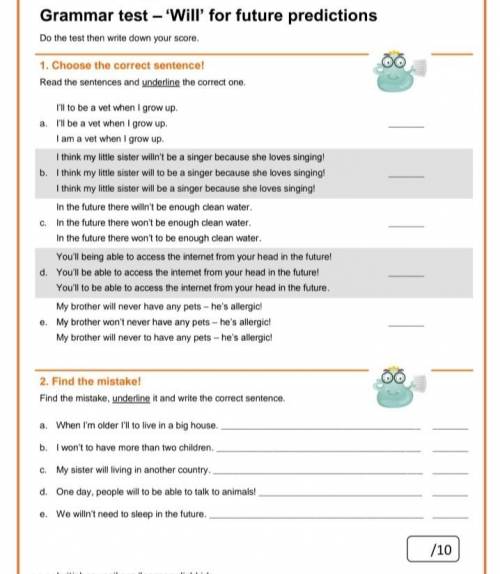Grammar test – ‘Will’ for future predictions – ANSWERS

Другие вопросы по теме Английский язык
Популярные вопросы
- 4 я часть теста. Тесттың 4шк бөлімі....
3 - Выпиши подлежащее и сказуемое, определи наклонение глагола-сказуемого....
2 - Какой объем водорода образуется при действии паров воды на 5 кг кокса,...
3 - Энтомологи провели учёт насекомых на 3 учётных площадках (каждая размером...
2 - Человек, поднимаясь на последний этаж здания, измерил давление. Барометр...
2 - 1.Sally will go to the club tomorrow , 1.Won t she? 2.Will she? 2.Let s...
1 - Над буквой Б(грибы). Выпишите эту характеристику, которая «выпадает» из...
1 - Если, на мгновение или немного дольше в районе головы или всего тела человека...
2 - Напишите письмо своему другу о прессе в Украине и ваших предпочтениях в...
2 - Прочитати будь-який твір і зробити відео до нього (надіслати в особисті...
3
1. Which sentence is correct?
a) I will go to the cinema tomorrow.
b) I go to the cinema tomorrow.
The correct answer is a) I will go to the cinema tomorrow.
Explanation: When talking about a future event, we use 'will' followed by the base form of the verb. In this case, the correct sentence shows the future intention of going to the cinema.
2. Which sentence is correct?
a) They will not come to the party next week.
b) They do not come to the party next week.
The correct answer is a) They will not come to the party next week.
Explanation: To form a negative sentence using 'will' for future predictions, we add 'not' after 'will' and before the verb. The correct sentence shows the prediction that they will not come to the party next week.
3. Which sentence is correct?
a) She will cooking dinner tonight.
b) She will cook dinner tonight.
The correct answer is b) She will cook dinner tonight.
Explanation: When talking about a future event, we use 'will' followed by the base form of the verb. The correct sentence shows the prediction that she will cook dinner tonight.
4. Which sentence is correct?
a) We will had a test next Friday.
b) We will have a test next Friday.
The correct answer is b) We will have a test next Friday.
Explanation: When talking about a future event, we use 'will' followed by the base form of the verb. The correct sentence shows the prediction of having a test next Friday.
5. Which sentence is correct?
a) He will not to go to school tomorrow.
b) He will not go to school tomorrow.
The correct answer is b) He will not go to school tomorrow.
Explanation: To form a negative sentence using 'will' for future predictions, we add 'not' after 'will' and before the verb. The correct sentence shows the prediction that he will not go to school tomorrow.
Remember, when using 'will' for future predictions, we use 'will' followed by the base form of the verb. For negative sentences, we add 'not' after 'will' and before the verb. It's important to pay attention to the correct verb form to ensure accurate future predictions.